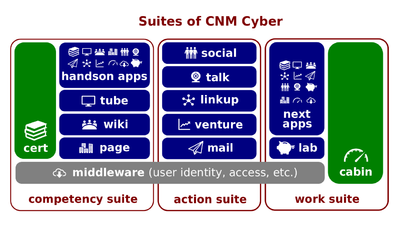Difference between revisions of "How Apps Are Built"
(→Script) |
(→Content) |
||
| Line 4: | Line 4: | ||
==Content== | ==Content== | ||
The predecessor [[lectio]] is [[CNM App Groups]]. | The predecessor [[lectio]] is [[CNM App Groups]]. | ||
| − | |||
| − | |||
===Script=== | ===Script=== | ||
| Line 17: | Line 15: | ||
:Finally, [[software system]]s are better when they are living projects. These systems shall be further developed and updated periodically. For instance, new versions of premier COTS solutions tend to be available twice a year. [[CNM Cyber Team]] strives to update all [[CNM app]]s to last stable versions of the ''applications'' that they use. The ''Team'' also makes best efforts to implement [[cyber-security]] patches and recommendations. | :Finally, [[software system]]s are better when they are living projects. These systems shall be further developed and updated periodically. For instance, new versions of premier COTS solutions tend to be available twice a year. [[CNM Cyber Team]] strives to update all [[CNM app]]s to last stable versions of the ''applications'' that they use. The ''Team'' also makes best efforts to implement [[cyber-security]] patches and recommendations. | ||
| + | |||
| + | ===Key terms=== | ||
| + | :[[Software system]], [[API]] | ||
===Closing=== | ===Closing=== | ||
Revision as of 06:42, 12 October 2020
How Apps Are Built (hereinafter, the Lectio) is the lesson part of the CNM App Essentials lesson that introduces its participants to CNM Cloud. This lesson belongs to the Introduction to CNM Cloud session of the CNM Cyber Orientation.
Content
The predecessor lectio is CNM App Groups.
Script
- Every CNM app represents a layered software system. It consists of one or more end-user applications. Consequently, any application consists of software blocks such as customer data organizers, task work organizers, and wiki engines. Some applications are modular -- their blocks are separate modules plugged to the application's core.
- If any CNM app uses more than one end-user application, these applications are interconnected through application programming interfaces (APIs) to function as one CNM app. Content management systems (CMSes) are most popular second applications in CNM core apps. They power websites of CNM apps.
- Every CNM app must communicate with WorldOpp Middleware using the Lightweight Directory Access Protocol (LDAP). If the COTS application lacks the LDAP, API, or other functionalities that CNM Cloud needs, an additional module or plugin shall be installed.
- With regard to their ownership, all the COTS solutions such as core applications, modules, and plugins are divided in proprietary and open-source. Proprietary applications are owned privately; their code is closed. All CNM apps are open-source. That means that these applications are community-owned. Their code is open; any contributor may review and, if needed, modify it for specific purposes.
- Finally, software systems are better when they are living projects. These systems shall be further developed and updated periodically. For instance, new versions of premier COTS solutions tend to be available twice a year. CNM Cyber Team strives to update all CNM apps to last stable versions of the applications that they use. The Team also makes best efforts to implement cyber-security patches and recommendations.
Key terms
Closing
- CNM Cabin is hosted by:
- CNM Cloud Next
- WorldOpp Federated Farm
- CNM EndUser Farm
- CNM HandsOn Farm
- None of the other answers is correct.
- Which statement below is correct:
- CNM Cyber may include three identical CNM apps.
- While taking this course, you work on the CNM EndUser Farm.
- Future administrators of CNM apps get hands-on training at the CNM Cloud Next.
- All of the other substantive answers are correct.
- None of the other answers is correct.
- CNM Cabin is hosted by:
How Apps Are Executed is the successor lectio.
